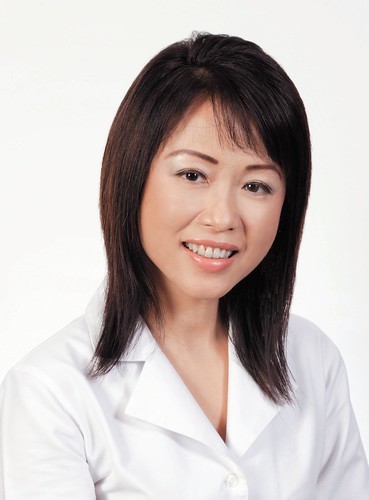- Joined
- Jan 23, 2010
- Messages
- 1,746
- Points
- 0
Vivian, Lily Neo in lively debate over aid schemes
NOT for the first time, Dr Lily Neo sparked a lively exchange yesterday about how best to provide for Singapore's poorest families.
The Jalan Besar GRC MP had challenged Community Development, Youth and Sports Minister Vivian Balakrishnan to set up a systematic programme to help the children of those in the bottom 5 per cent of earners.
This prompted him to reiterate firmly the Government's philosophy: that help will be provided to those most in need, but this should not erode self-reliance.
The bulk of Dr Neo's remarks during the debate on the ministry's budget focused on the need for a new safety net for the children of the neediest families.
'May I urge the minister to improve the plight of the children from the lowest income families through such a permanent and constructive safety-net?'
Dr Balakrishnan passed over her specific suggestion in his response and highlighted various existing schemes instead.
But when the time came for MPs to seek clarifications from the minister, Dr Neo was the first to stand and speak:
'Does he see that the many assistance schemes he mentioned earlier are not addressing this vulnerable group's predicaments? Does he believe in the opportunity of levelling up and the chance of social mobility?'
Dr Balakrishnan noted that he and Dr Neo actually agree that children in vulnerable families need more help. Where they differed, he said, was in the solution.
He stressed that the Government's position has been to avoid a 'permanent, unconditional, needs-based social safety net'. The Government, he added should form the last line of defence, not the first.
It should be social workers at the frontlines, not politicians, he added.
'There is now a greater appreciation of the fact that you need a coordinated consistent approach. But where I will disagree with her (Dr Neo), and perhaps I'm misreading her, is the assumption that the Government is the solution. Government cannot be the solution. Government has to be part of the solution... It is the key to how we organise ourselves as Singapore and the key to our success.'
But Dr Neo was not to be put off. Her parting remark: 'I'm very encouraged when minister said earlier that we are not short of resources. Therefore, I hope the minister will reconsider giving these resources we are not short of to these vulnerable groups that are really in need.'
To which he replied: 'I just want to reaffirm that we do allocate more resources for people who need more help.'
Dr Neo, who regularly gives voice in Parliament to the plight of the poor and most vulnerable, has previously had sharp exchanges with Dr Balakrishnan and Minister of State Yu-Foo Yee Shoon on issues including assistance to the poorest 20 per cent of households, and on increasing the allowances for those on the Public Assistance scheme.
JEREMY AU YONG
NOT for the first time, Dr Lily Neo sparked a lively exchange yesterday about how best to provide for Singapore's poorest families.
The Jalan Besar GRC MP had challenged Community Development, Youth and Sports Minister Vivian Balakrishnan to set up a systematic programme to help the children of those in the bottom 5 per cent of earners.
This prompted him to reiterate firmly the Government's philosophy: that help will be provided to those most in need, but this should not erode self-reliance.
The bulk of Dr Neo's remarks during the debate on the ministry's budget focused on the need for a new safety net for the children of the neediest families.
'May I urge the minister to improve the plight of the children from the lowest income families through such a permanent and constructive safety-net?'
Dr Balakrishnan passed over her specific suggestion in his response and highlighted various existing schemes instead.
But when the time came for MPs to seek clarifications from the minister, Dr Neo was the first to stand and speak:
'Does he see that the many assistance schemes he mentioned earlier are not addressing this vulnerable group's predicaments? Does he believe in the opportunity of levelling up and the chance of social mobility?'
Dr Balakrishnan noted that he and Dr Neo actually agree that children in vulnerable families need more help. Where they differed, he said, was in the solution.
He stressed that the Government's position has been to avoid a 'permanent, unconditional, needs-based social safety net'. The Government, he added should form the last line of defence, not the first.
It should be social workers at the frontlines, not politicians, he added.
'There is now a greater appreciation of the fact that you need a coordinated consistent approach. But where I will disagree with her (Dr Neo), and perhaps I'm misreading her, is the assumption that the Government is the solution. Government cannot be the solution. Government has to be part of the solution... It is the key to how we organise ourselves as Singapore and the key to our success.'
But Dr Neo was not to be put off. Her parting remark: 'I'm very encouraged when minister said earlier that we are not short of resources. Therefore, I hope the minister will reconsider giving these resources we are not short of to these vulnerable groups that are really in need.'
To which he replied: 'I just want to reaffirm that we do allocate more resources for people who need more help.'
Dr Neo, who regularly gives voice in Parliament to the plight of the poor and most vulnerable, has previously had sharp exchanges with Dr Balakrishnan and Minister of State Yu-Foo Yee Shoon on issues including assistance to the poorest 20 per cent of households, and on increasing the allowances for those on the Public Assistance scheme.
JEREMY AU YONG





